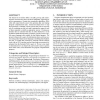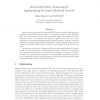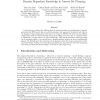432 search results - page 24 / 87 » Open answer set programming for the semantic web |
LOPSTR
1994
Springer
14 years 2 days ago
1994
Springer
The unfold/fold transformation system defined by Tamaki and Sato was meant for definite programs. It transforms a program into an equivalent one in the sense of both the least tter...
SEMWEB
2004
Springer
14 years 1 months ago
2004
Springer
Abstract. The shift from Web pages to Web services enables programmatic access to the near limitless information on the World Wide Web. Autonomous agents should generate concise an...
ICSE
2010
IEEE-ACM
13 years 10 months ago
2010
IEEE-ACM
The feature list of modern IDEs is steadily growing and mastering these tools becomes more and more demanding, especially for novice programmers. Despite their remarkable capabili...
DLOG
2003
13 years 9 months ago
2003
Agent systems that search the Semantic Web are seen as killer applications for description logic (DL) inference engines. The guiding examples for the Semantic Web involve informat...
CORR
2002
Springer
13 years 7 months ago
2002
Springer
In this paper we consider three di erent kinds of domain dependent control knowledge (temporal, procedural and HTN-based) that are useful in planning. Our approach is declarative ...



